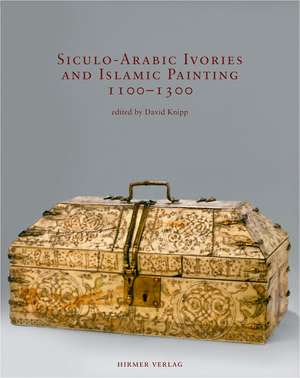Siculo-Arabic Ivories and Islamic Painting: 1100-1300
Editat de David Knippen Limba Engleză Hardback – 14 apr 2012
The brilliantly painted ivory boxes from twelfth-century Norman Sicily have long been regarded as some of the most extraordinary artifacts recovered there. Evidence of the rich and multilayered culture, these small but distinctly exotic boxes also demonstrate the Normans’ fascination with Islamic culture and art. Yet despite their undeniable historical importance, the last comprehensive examination of the Sicilian ivories was published in 1939.
Siculo-Arabic Ivories and Islamic Painting: 1100–1300 is the first book-length treatment devoted exclusively to the ornate ivory boxes in more than seventy years. Among the many contributors to this volume are Marianne Barrucand, Anthony Cutler, Thomas Dittelbach, Maria Vittoria Fontana, Eva Hoffman, Mat Immerzeel, David Knipp, Martina Müller-Wiener, and Mourad Rammah.
Preț: 705.81 lei
Preț vechi: 860.75 lei
-18% Nou
Puncte Express: 1059
Preț estimativ în valută:
135.07€ • 139.54$ • 112.42£
135.07€ • 139.54$ • 112.42£
Carte indisponibilă temporar
Doresc să fiu notificat când acest titlu va fi disponibil:
Se trimite...
Preluare comenzi: 021 569.72.76
Specificații
ISBN-13: 9783777443119
ISBN-10: 3777443115
Pagini: 340
Ilustrații: 45 color plates, 227 halftones
Dimensiuni: 241 x 290 x 33 mm
Greutate: 2.2 kg
Editura: Hirmer Publishers
Colecția Hirmer Publishers
ISBN-10: 3777443115
Pagini: 340
Ilustrații: 45 color plates, 227 halftones
Dimensiuni: 241 x 290 x 33 mm
Greutate: 2.2 kg
Editura: Hirmer Publishers
Colecția Hirmer Publishers
Notă biografică
David Knipp is an art historian and research fellow. He is a recipient of the Hanno and Ilse Hahn Prize for Outstanding Contributions to Italian Art History.
Cuprins
Ivory Painting in the Norman Kingdom of Sicily: An Introduction
David Knipp
I. Manufacture, Perception, and Distribution
How and for Whom They Made the Boxes
Anthony Cutler
Hidden Aesthetics and the Art of Deception: The Object, the Beholder, and the Artisan
Avinoam Shalem
Incrusted with Ivory: Observations on a Casket in the Victoria and Albert Museum
Mariam Rosser-Owen
The St Petroc Casket, a Certain Mutilated Man, and the Trade in Ivories
Antony Eastmond
Translation in Ivory: Interactions Across Cultures and Media in the Mediterranean during the Twelfth and Thirteenth Centuries
Eva R. Hoffman
II. Iconography, Artistic Heritage, and Workshop Identity
Hunting with Cheetahs on Painted Siculo-Arabic Ivories
Maria Vittoria Fontana
The Painted Ivory Box Made for the Fatimid Caliph al-Mu'izz
Jonathan M. Bloom
Siculo-Arabic Ivories: Christian Motifs in Muslim Painting
Erica Cruikshank Dodd
Ceiling and Casket at the Cappella Palatina and Christian Arab Art between Sicily and Egypt in the Twelfth and Thirteenth Centuries
Lucy-Anne Hunt
Pattern and Ornament in Siculo-Arabic Ivory Painting: The Track Leads to the Norman Principality of Antioch
David Knipp
A Mixed Company of Syrians, Saracens and Greeks: Artistic Interaction in Middle Eastern Christian Art in the Middle Ages
Mat Immerzeel, Adeline Jeudy, Bas Snelders
III. Parallel Currents in Islamic Art
A Ghaznavid Narrative Relief and the Problem of Pre-Mongol Persian Book Painting
Finbarr Barry Flood
Puns and Puzzles: The Interplay of the Visual and the Verbal in Thirteenth-Century Mesopotamian Metalwork, Book Painting, and Astrolabes
Martina Müller-Wiener
The Marble Casket in the Museum of Islamic Art in Berlin: Sources, Function, and Iconology
Thomas Dittelbach
Appendix
Descriptive Catalogue of Siculo-Arabic Ivories Exhibited in Berlin, Museum für Islamische Kunst, July–August 2007
David Knipp
David Knipp
I. Manufacture, Perception, and Distribution
How and for Whom They Made the Boxes
Anthony Cutler
Hidden Aesthetics and the Art of Deception: The Object, the Beholder, and the Artisan
Avinoam Shalem
Incrusted with Ivory: Observations on a Casket in the Victoria and Albert Museum
Mariam Rosser-Owen
The St Petroc Casket, a Certain Mutilated Man, and the Trade in Ivories
Antony Eastmond
Translation in Ivory: Interactions Across Cultures and Media in the Mediterranean during the Twelfth and Thirteenth Centuries
Eva R. Hoffman
II. Iconography, Artistic Heritage, and Workshop Identity
Hunting with Cheetahs on Painted Siculo-Arabic Ivories
Maria Vittoria Fontana
The Painted Ivory Box Made for the Fatimid Caliph al-Mu'izz
Jonathan M. Bloom
Siculo-Arabic Ivories: Christian Motifs in Muslim Painting
Erica Cruikshank Dodd
Ceiling and Casket at the Cappella Palatina and Christian Arab Art between Sicily and Egypt in the Twelfth and Thirteenth Centuries
Lucy-Anne Hunt
Pattern and Ornament in Siculo-Arabic Ivory Painting: The Track Leads to the Norman Principality of Antioch
David Knipp
A Mixed Company of Syrians, Saracens and Greeks: Artistic Interaction in Middle Eastern Christian Art in the Middle Ages
Mat Immerzeel, Adeline Jeudy, Bas Snelders
III. Parallel Currents in Islamic Art
A Ghaznavid Narrative Relief and the Problem of Pre-Mongol Persian Book Painting
Finbarr Barry Flood
Puns and Puzzles: The Interplay of the Visual and the Verbal in Thirteenth-Century Mesopotamian Metalwork, Book Painting, and Astrolabes
Martina Müller-Wiener
The Marble Casket in the Museum of Islamic Art in Berlin: Sources, Function, and Iconology
Thomas Dittelbach
Appendix
Descriptive Catalogue of Siculo-Arabic Ivories Exhibited in Berlin, Museum für Islamische Kunst, July–August 2007
David Knipp
Recenzii
“A beautifully edited and fully illustrated publication. . . . This kind of object of material culture can easily fall between the gaps in academic scholarship because it fails to slot neatly into traditional art-historical classifications. . . . David Knipp rightly points out in his introduction that the term 'Siculo-Arabic ivories' is a misleading one. It suggests that this is a straightforward group of painted and gilded ivory containers made in Sicily by Muslim craftsmen. The papers in the volume reveal a much more complicated story.”
